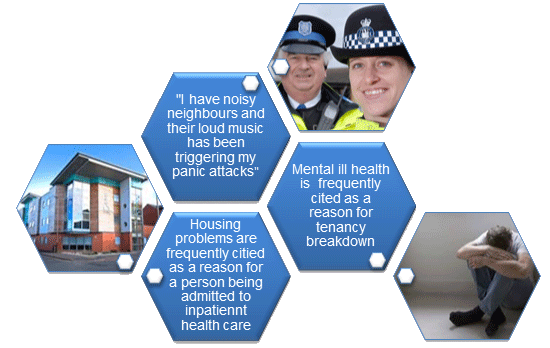Joint Mental Health DRAFT Commissioning Strategy
Feedback updated 22 Jan 2016
We asked
We consulted the public to seek their views and opinions concerning the final version of a new Joint Mental Health Commissioning Strategy. There was a good response from professionals and people who use services, but limited response from carers.
You said
The overall strategy was well thought out, picking up the most important elements that would improve mental health services.
The detail of an implementation plan and practice delivery needed to be added.
A number of specific mental health needs were mentioned and linked to operational practice.
Raised concerns about reducing budgets and the need to ensure preventitative support is available, alongside a range crisis supports.
Your views and opinions have helped inform the development of the new strategy.
We did
We have developed the strategy and included all the feedback you have given us over the last year.
We need to explore how to engage with more carers.
A delivery action plan will be published along side the final strategy which will detail projected timescales and responsibilites. This is at a strategic level and does not address operational needs relating to specific mental health needs.
Budget pressures will be shared with users and carers via the Mental Health Partnership Board, and financial discussions are part of the mental health Better Care Together work-streams.
This strategy will now be implemented in 2016. The Mental Health Partnership Board will have a key role in monitoring the implementation.
Overview

This DRAFT Joint Commissioning Strategy on Mental Health in Leicester aims to improve services and people’s experience of them by focusing on the wider determinants of health and wellbeing, developing prevention and early intervention services and appropriate care, while at the same time addressing major financial challenges.
The strategy has been produced with the involvement of all partners, including parents, carers, service users and professionals.
Why your views matter
At a time of increasing pressures on funding it is important that we focus our resources on those who need the most support, whilst continuing to enable those with lower needs to improve or maintain their health, wellbeing and independence.
Not only do we have a legal responsibility to consult we also recognise that in order to provide the best support and services we need to involve those people that provide services, those that use services and those that support others to access services.
This is our DRAFT strategy
It sets out our direction of travel, the key priorities over the next 4 years.
This is your opportunity to tell us if you think we have got it right and if not what needs to change.
If you would like to have a printed copy of the questions or of the DRAFT strategy please contact;
Kavita.Dholakia@leicester.gov.uk
We are also happy to come out and meet with any groups that would like to get involved or that would prefer to talk about the strategy rather than completing the online questions.
If you would like someone to come out to your group please contact
alyson.taylor@leicester.gov.uk

What happens next
Following the consultation all comments will be used to finalise the strategy - it will then be signed off by all relevant partners.
The strategy will then be publicly available , and a working group will be set up to work on the action plan to support the outcomes.
Areas
- Abbey
- Aylestone
- Beaumont Leys
- Belgrave
- Braunstone Park & Rowley Fields
- Castle
- Evington
- Eyres Monsell
- Fosse
- Humberstone & Hamilton
- Knighton
- Rushey Mead
- Saffron
- Spinney Hills
- Stoneygate
- Thurncourt
- Westcotes
Audiences
- Children and young people
- Working-age people
- Older people
- Carers
- Full-time and part-time workers
- Disabled people
- Gypsy and Traveller community
- Older households (65+)
- Single people
- Families with children
- Couples
- All households
- Faith groups
- Sports clubs
- Youth clubs
- Carers' network
- Trade unions
- Voluntary organisations
- Community organisations
- Self-help groups
- User groups
- Third sector infrastructure groups
- All Voluntary and Community Organisations
- Advocacy organisation
- Drug and Alcohol services
- Health services
- Police
- NHS
- FE colleges
- Universities
- Schools
- Businesses
- All Public and Private Organisations
- Service providers
- Partner agencies
- Directors
- Heads of service
- Managers, team leaders and supervisors
- Professionals
- All staff
- SCE staff
- Service users
- Care home residents and their next of kin
Interests
- Adult social care and safeguarding
- Public health
- Adult social care
- Education and children's services


Share
Share on Twitter Share on Facebook